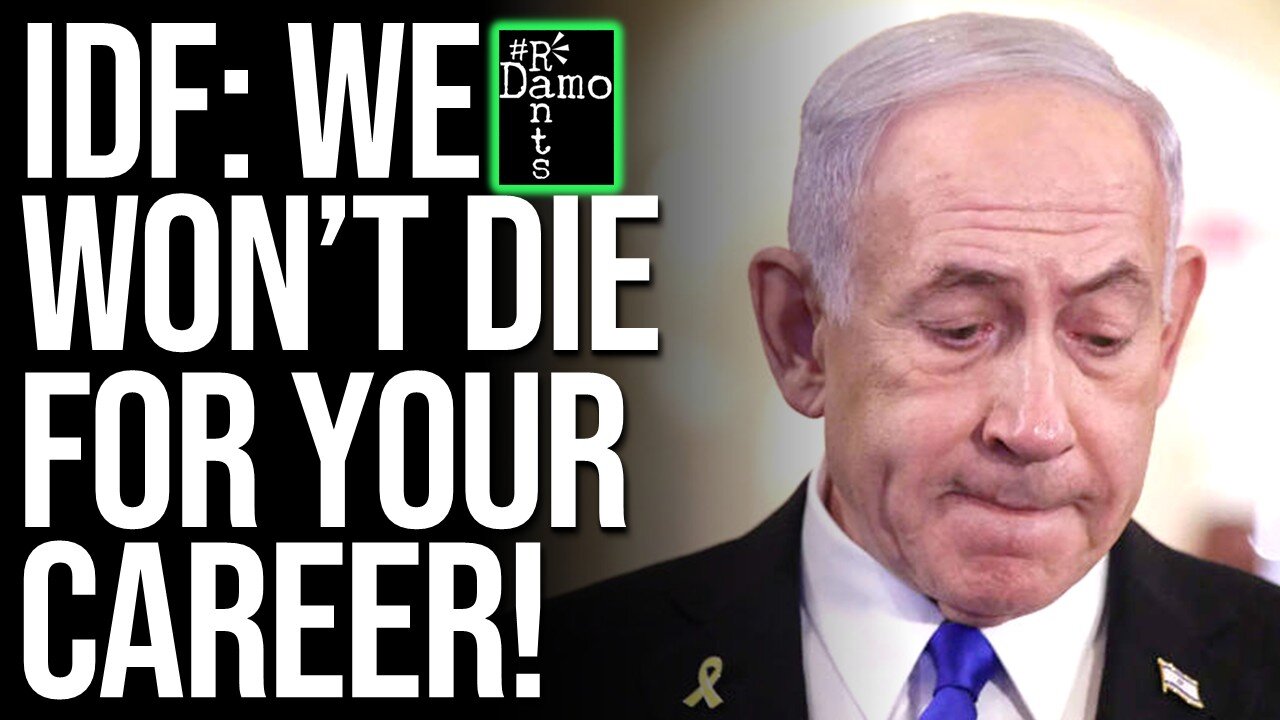Premium Only Content

Netanyahu Got the War He Wanted—And Now It’s Consuming Him
Right, so from the outset, Israel’s genocide Gaza was framed by Benjamin Netanyahu as a war of necessity, not choice—a war to “eliminate Hamas,” rescue hostages, and reassert Israeli deterrence after the shock of October 7. It was branded a mission of national redemption, and Netanyahu cloaked his campaign in the language of moral clarity, security, and historical destiny even. Yet, nearly two years on, what began as an operation to rescue those hostages and defeat a non-state militant group has metastasised into a catastrophic strategic, political, legal, and moral collapse.
Today, Israel finds itself isolated internationally, its propaganda machine on life support, internally fractured, and diplomatically disgraced. Its war cabinet is paralysed. Its military leadership is in open resistance. Its intelligence community is leaking warnings of disaster. More than 600 former Israeli security officials—from the IDF, Mossad, Shin Bet, and National Security Council—have issued coordinated calls for the war’s end, warning that the country is “on the precipice of defeat.” Meanwhile, Gaza lies in ruins, famine has taken hold, and those hostages remain either trapped or dead—many as a result of Israel’s own military operations.
It is now being openly spoken about within Israeli military circles that Israel is not merely facing difficulty in Gaza—it is facing defeat: not because Hamas is victorious on the battlefield, but because Israel’s institutions are imploding from within, its global legitimacy is vanishing, and its leadership is pursuing a war that no longer serves national survival but one man’s political preservation and more and more people know it.
Right, so at the centre of Israel’s internal disarray is the mounting tension between Chief of Staff Eyal Zamir and the Netanyahu government. Zamir, was appointed earlier this year, back in March, replacing Herzi Halevi, citing the failures of October 7th as his reason for doing so, kinda took him a while to choose to go then didn’t it? Nothing suspicious about that I’m sure. But Zamir was expected to bring a hardline approach and disciplined execution of the cabinet’s directives. Instead, he has emerged as a fulcrum of resistance against Netanyahu’s push for full occupation of Gaza.
Reports from The Cradle indicate that tensions between the military and government have reached their apex. Zamir has objected to Operation Gideon’s Chariots—the full-scale ground invasion of southern Gaza—on operational, ethical, and strategic grounds. He has warned that such a campaign would not only risk the lives of the remaining hostages, but also mire the IDF in an unwinnable insurgency, requiring indefinite manpower and offering no clear exit.
This resistance is being expressed in more than just words as well. Zamir cancelled a scheduled US visit to remain in Israel during the peak of the cabinet dispute. His command has scaled back deployments and quietly withdrawn planned reserve call-ups. According to reports by Reuters and The Palestine Chronicle, this pushback caused Netanyahu to postpone a key cabinet session on Gaza’s future. Ynet News further confirmed that top military planners are stalling political orders and re-evaluating force readiness in light of IDF-wide exhaustion.
Dissent is not limited to the top brass. Mid-ranking officers and reservist units are leaking their frustrations through anonymous channels, while some reservist brigades have openly refused redeployment orders. Military analysts have compared this situation to the 1982 Lebanon War, during which operational dissent festered in the IDF over the goals and ethics of the campaign. But unlike Lebanon, where political leadership was more unified, Israel today is governed by a deeply divided cabinet, now a minority administration, whose credibility is plummeting.
The IDF’s own institutional memory is being tested. The concept of “purity of arms,” once central to its identity, has come under scrutiny amid war crimes allegations, very justifiable and evidenced ones to say the least. Zamir’s resistance, therefore, whilst a shock to the Netanyahu regime, really shouldn’t be. He represents an institution struggling to preserve its legitimacy under political directives that appear to be sacrificing military rationale for short-term ideological gain, to keep Netanyahu in power by placating the likes of Smotrich and Ben Gvir.
Beyond serving officers, Israel’s broader security establishment has turned decisively against the war as well. On August 3, a coalition of more than a dozen former senior officials—including multiple ex-IDF chiefs, former Mossad and Shin Bet directors, and past national security advisors—issued a joint video warning that the country was on the “precipice of defeat.” Their message was sharp: military objectives have been exhausted, the humanitarian crisis is unspeakable, and the only path forward is political now. The genocide has to end.
This video was followed by an unprecedented public letter signed by over 600 retired Israeli security officials. This letter urged not only an immediate ceasefire but also negotiations with Hamas to recover the remaining hostages, the only viable way to do so alive, starving to death as they are now along with the rest of Gaza and prevent further strategic deterioration. The significance of this cannot be overstated, because we’re in all new territory here, this is unprecedented stuff: these are the architects of Israeli power, the men who built and ran the very institutions now warning of collapse.
Al Jazeera and France 24 covered the statement’s release and global resonance, highlighting how this internal rebellion reflects not only a tactical divergence, but a fundamental break in belief that Israel’s war is just, winnable, or necessary. In a state where security consensus has traditionally driven political unity, this open revolt signals systemic fracture now.
So this then brings us around to the crux of the issue and the fundamental question that if the war lacks a viable endgame according to those who are actually fighting it, why does it continue?
Well we know the answer to that don’t we? The answer lies in the logic of political survival, specifically one mans. A major investigation by The New York Times, summarised by The Jewish Independent, revealed that Netanyahu has repeatedly rejected ceasefire proposals—including those that offered hostage releases—so as to maintain his governing coalition and avoid personal legal exposure. These findings suggest nothing we didn’t kow before of course, that the war is no longer about national security but about the prime minister’s own future, however even mainstream US media outlets are now openly saying it.
The Arab Center DC has similarly characterised Netanyahu’s strategy as a “calculus of conflict,” though they did so back in April, the mainstream are finally catching up as it were, all designed to delay political collapse. By sustaining war hysteria, he has attempted to shield himself from both electoral accountability and international prosecution, but those arrest warrants came from the ICC anyway and Israeli elections are not that far away either.
Public trust is eroding. Polls conducted by Israeli outlets suggest that a growing majority of citizens blame Netanyahu for mishandling both the war and the hostage crisis. Thousands of families of reservists and hostages are protesting outside his residence in Caesarea. Yet he clings to power by wrapping himself in the flag—at immense human and national cost.
The question of victory remains unanswered because victory itself has become undefinable. What does it even mean anymore compared to the initial justification of rescuing the hostages? While Israel has degraded much of Hamas’s visible infrastructure, the militant group perseveres. Intelligence reports leaked via Press TV suggest that Hamas’s decentralised command and asymmetric tactics have allowed it to outlast Israel’s most intensive campaigns.
The IDF is stretched thin. Units are demoralised. Reservists are refusing call-ups in growing numbers, suicide numbers are growing. And yet, Netanyahu’s cabinet continues to demand more. According to other reports, planners consider full occupation as being demanded, full annexation of Gaza now on top of the West Bank as a “strategic suicide,” especially in the absence of a long-term administrative solution.
Moreover, the idea of transferring control to the Palestinian Authority, an international force, or a UN-administered body has been rejected outright by key factions in Netanyahu’s government. This leaves only two options: indefinite occupation or negotiated withdrawal. The former is logistically untenable; the latter, politically toxic. Israel is stuck in a war it cannot escalate, end, or win.
The international community has responded with mounting fury. Israel’s war has triggered an avalanche of legal scrutiny and diplomatic rebuke. The ICC has issued arrest warrants for Netanyahu and Former Defense Minister Yoav Gallant on charges of war crimes.. Simultaneously, the ICJ has allowed a genocide case against Israel to proceed, ruling that the allegations brought forward by South Africa are “plausible.”
This legal assault is being mirrored by a collapse in Israel’s diplomatic standing. Nations such as Slovenia, Ireland, Spain, and Norway have either imposed arms embargoes or formally recognised Palestine. Belgium has used universal jurisdiction to arrest Israeli nationals. The Netherlands has labelled Israel a “national security threat.” Even traditional allies in Europe and North America are privately expressing dismay, if not open revolt.
According to another Press TV analysis the narrative of “self-defence” no longer holds. Humanitarian agencies like MSF, Amnesty, and Human Rights Watch have all accused Israel of deliberately starving civilians and targeting hospitals and shelters.
The reputational damage is now systemic. Israeli embassies face protests. Cultural events are cancelled. Academic exchanges are frozen. The Boycott, Divestment, and Sanctions (BDS) movement is surging, not just among activists, but in corporate boardrooms and political chambers as well.
Domestically, resistance is intensifying. Civil society is awakening to the cost and futility of the war. Hostage families, long treated as symbols of national unity, are now among the most forceful critics of Netanyahu’s approach. Movements such as Bring Them Home Now and Kaplan Force have accused the government of sacrificing their loved ones for optics.
Mass protests in Tel Aviv, Haifa, and Jerusalem have drawn tens of thousands, demanding not only a ceasefire but Netanyahu’s resignation. Jewish and Palestinian citizens of Israel are marching together under banners that read “Jews Against Genocide” and “Not In Our Name.”
The response from the state has been repression: detentions, surveillance, and anti-protest legislation. Yet the protests grow stronger each week. They are joined by former generals, military families, and even religious leaders.
Alongside the IDF’s rebellion, Israel’s intelligence agencies are experiencing their own crisis of conscience. Reports suggest senior Mossad and Shin Bet officials have privately urged the Prime Minister’s Office to pursue a ceasefire.
Leaked documents reveal that intelligence assessments—while publicly aligned with government policy—have long predicted failure. Whistleblowers have accused top Mossad staff of manipulating briefings to avoid contradicting Netanyahu.
Intelligence services were once Israel’s most trusted institutions, immune from political scandal. Now they are enmeshed in it.
The International Court of Justice’s interim ruling in January of last year saw the Court order provisional measures, including ceasing starvation and allowing aid—but these have ignored.
International law, once seen by Israel as irrelevant, is now a battleground. Tel Aviv’s former assumption of impunity has shattered.
At its core, this war is not just military—it is ideological. The dream of a “Jewish and democratic” state cannot survive perpetual occupation. The two-state solution is dead. Gaza is destroyed. The West Bank is militarised. And apartheid is entrenched.
Younger Israelis and many Jews worldwide who weren’t previously anti Zionist are now questioning Zionism itself finally as a result. Protests in New York, London, and Paris have featured slogans like “Anti-Zionist Jews for Peace.”
This war is thus a death knell for liberal Zionism and I;m all here for that, it is a racist colonialist ideology. What remains is either a single apartheid state—or a fundamental transformation from what currently exists and it needs to be the latter.
The IDF no longer believes in the mission. The intelligence community warns of strategic collapse. Hundreds of ex-security officials demand an end. Civil society is rising in revolt. The world is watching—and judging.
This is not just a military failure. It is a crisis of legitimacy, ethics, and governance. It is what defeat looks like in the 21st century and no matter how special the chosen people of Israel think they are, how much of an exception to the rules of others that they should be, the truth is they aren’t any different, the same rules apply to them—so this is not a battlefield surrender, its much bigger than just that, it’s the slow implosion of a state that mistook power for principle, force for strategy, and silence for consent.
Therefore as much as the genocide continues. Israel has already lost it. Any semblance of something they can turn around and attempt to hasbara into a victory, is still going to be overwhelmingly pyrrhic.
The only remaining question is whether its leaders will ever admit it—or whether they will drag the country deeper into the abyss to postpone what many of their own people, from the IDF to Mossad are saying is an inevitable reckoning.
The failure of Israeli propaganda has once again been exposed in recent days too, as claims of graffiti being a threat to Jewish people in Athens, by the Israeli Ambassador to Greece, despite it already being removed, have been devastatingly shredded by Athens left wing Mayor, who has said he’s going to take no lessons in morality from a nation that kills civilians, the blood of the people of Gaza apparently less important to this ambassador than some paint on a wall, which was anti Zionist rather than antisemitic anyway, but they do like to conflate the two don’t they? Get all the details of that story in this video recommendation here as your suggested next watch.
Please do also hit like, share and subscribe if you haven’t done so already so as to ensure you don’t miss out on all new daily content as well as spreading the word and helping to support the channel at the same time which is very much appreciated, holding power to account for ordinary working class people and I will hopefully catch you on the next vid. Cheers folks.
-
 LIVE
LIVE
Dr Disrespect
2 hours ago🔴LIVE - DR DISRESPECT - BLACK OPS 7 - GIVE ME BACK MY NUKE
1,475 watching -
 LIVE
LIVE
The White House
58 minutes agoPress Secretary Karoline Leavitt Briefs Members of the Media, Oct. 6, 2025
1,177 watching -
 1:01:20
1:01:20
Timcast
2 hours agoTexas National Guard DEPLOYED To ILLINOIS, Governor Declares INVASION
38.1K42 -
 LIVE
LIVE
The Charlie Kirk Show
1 hour agoThe Killer AG + Kav Assassin's 8 Years + The Battle of Portland | Hemingway, Davis | 10.6.2025
8,387 watching -
 2:06:01
2:06:01
Steven Crowder
4 hours agoDeport Them All: Trump Takes Fight to Leftist Chicago & Portland Over Attacks on ICE
201K247 -
 1:01:46
1:01:46
The Rubin Report
2 hours agoBill Maher’s Crowd Stunned as Van Jones Gives a Brutal Message to Liberal Media
23.8K48 -
 LIVE
LIVE
Nerdrotic
3 hours agoHollywood Will EAT Itself | Amazon BENDS The Knee to 007 Fans - Nerdrotic Nooner 524
433 watching -
 LIVE
LIVE
The Shannon Joy Show
3 hours agoMoody’s: Recession Incoming! Economic Slowdown Crushing Americans while Trump builds a ballroom
212 watching -
 LIVE
LIVE
The Mel K Show
2 hours agoMORNINGS WITH MEL K -Armor of God: Humanity Must Choose their Destiny 10-6-25
816 watching -
 LIVE
LIVE
LFA TV
18 hours agoLIVE & BREAKING NEWS! | MONDAY 10/6/25
3,657 watching
